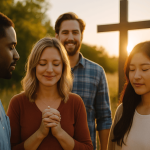It doesn’t matter who goes first.
That’s a phrase that I say multiple times a day, every day. Sometimes it’s in the midst of a small child lying in a pool of tears on the cold, hard tile because they just can’t cope with the idea of being last. Regardless of how many times I utter that phrase, it really does matter to my dear children who walks through the door first, who brushes their teeth first, and who rides their bicycle down the sidewalk first.

These arguments that I’m charged with mediating seem so petty, yet they can spark big emotions in all of us. One child cries and points fingers, the other stomps away, and I’m doing everything I can to keep from snapping. What is it about being first that can cause such a chasm between us?
As petty as it may seem, children often reveal to us the most basic instincts and desires that we all possess. This need to make sure that we’re at the front of the line is ingrained deep within our human nature. We are wired to protect ourselves and all that we think we deserve. And don’t we believe that we deserve to be at the top?
Maybe we fear that if we’re not first, we’ll end up at the end of the line with nothing left for us but the scraps. We fear that there’s not enough to go around. We fear that someone else’s success means our failure. So we strive and we compete. We make enemies out of others whom we believe are standing in our way. This only leads to division, fear, and strife. It separates us, fools us into thinking that we are in danger, and blinds us to the needs of others.
It’s so easy to default to this “me first” mentality. Whether it’s in relationships or in the ways we view public policy, it is natural to think first about getting what I want. It’s natural to try to protect our own status and privilege. But Jesus came to show us a different way.
Jesus tells us that in his kingdom…
Many who are first will be last, and many who are last will be first.
– Matthew 19:30
Jesus turns our normal mode of operation upside down. God’s kingdom, which is present now, is not like the empires of the world. It is surprising and unexpected. It challenges our natural instincts and stands in opposition to the status quo. This is good news for those who have been kept down, those who have felt the boot of the empire on their neck (Luke 4:18-19). But it often feels like a threat to those of us who are used to being first. We might see it as an attack, or we might even try to argue that we’re really the ones who have been left out or kept down. We might feel as though allowing others to step forward will mean our demise.
This idea of reversing the roles is not about a forceful overthrow of those who have held the power. Instead, it’s about mutual submission that’s based in love and respect, in which we all uphold the dignity of each other (Eph. 5:21). We consider others’ needs and put them before ourselves (Phil. 2:3-4) – not because we don’t deserve to have our needs met, but because we see the image of God in our brothers and sisters, and we know that as we look out for them, they’ll be looking out for us, too.
Jesus modeled what it looks like to willingly lay down his life for us. The one who rightfully sat on the throne stepped down into the chaos and grit of our world. He didn’t come with the pomp and circumstance he deserved but instead came humbly as a vulnerable baby to a young unwed woman. He didn’t grasp for status, wealth, or power but was content to roam around with no real home of his own, socializing with those who had been cast out. Jesus didn’t expect others to fall at his feet; rather, he knelt down and washed the dirt and grime off his followers’ feet.
Jesus had no need to satisfy his ego because he knew who he was. His Father had made it clear from the beginning – he was the beloved Son of God (Matt. 3:17). Jesus grounded himself in that identity, and that was what allowed him to hold loosely all that the world had to offer. Status, wealth, and privilege had no grasp on him because he was secure in his identity as beloved.
You and I – we have that same identity, but I don’t think we always live in it. Maybe you’ve grown up hearing that God loves you, but the words sound more like a Sunday school song than a deep truth that drives your life. And so you chase after approval. You try to prove your worth. You try to earn your way to the front of the line, and you expect others to do the same.
I imagine that God looks at this striving and competing, and his heart breaks. He says, “Do you not trust that I love you and that I want to provide everything you need? Do you not understand that the same is true for your brothers and sisters?”
When we’re grounded in the fact that we’re loved, we’re able to call out that reality in others as well. We’re able to recognize that everyone else is just as worthy as we are to be seated in a place of honor. Suddenly, the call to put others first doesn’t feel like a threat because our worth is not bound up in our space in line. We won’t fear that we’ll be left in the dust. We won’t feel threatened when those who have been kept down are given a boost. We won’t feel thwarted when they are given what had previously been kept from them. We won’t feel rejected when we’re asked to sit down and give someone else the mic when they’ve previously been ignored. We’ll recognize that no one is trying to steal anything from us but that it’s good and right to give others their turn at the front of the line.
Jesus tells us,
Whatever you did for one of the least of these brothers and sisters of mine, you did for me.
– Matthew 25:40
It doesn’t take much to look around and see who is considered the least of these in our society. Where are those who are hungry? Who has been treated as a stranger and a danger? Who is sick and hurting? Where are the prisoners and those who have been oppressed? (Matt. 25:34-36) In this upside-down kingdom, we should not be okay with keeping these brothers and sisters of ours down. We shouldn’t buy into the justifications that try to explain why they don’t deserve anything else. We must actively create ways for them to be raised up and for their dignity to be restored. We must quiet ourselves and listen to their stories. We must give what we have to make sure that they have what they need. We must lay down our privilege so that they can experience the same advantages we’ve been given.
This is what the kingdom of God looks like here on earth, and the church is charged with making this a reality. We’ve seen the futility of the systems of the world that are filled with oppression and violence and corruption. We’re invited to live differently and to repair those broken systems so that we all might experience the love and goodness of God.
When I see my children racing to the door or crying over coming in last, my heart breaks. Can’t they see that their competition only creates conflict? Can’t they see that there’s a better way to treat one another that brings peace and joy? Can’t they see that they have what they need?
What I want my kids to know is what I want you to know as well…
Sometimes you’ll go first and sometimes you’ll be last, but you’ll always be loved. Sometimes you’ll give and sometimes you’ll receive, but you’ll always be valued. Sometimes you’ll speak up and sometimes you’ll listen, but you’ll always belong. Make space for others so that they might experience that truth as well.













